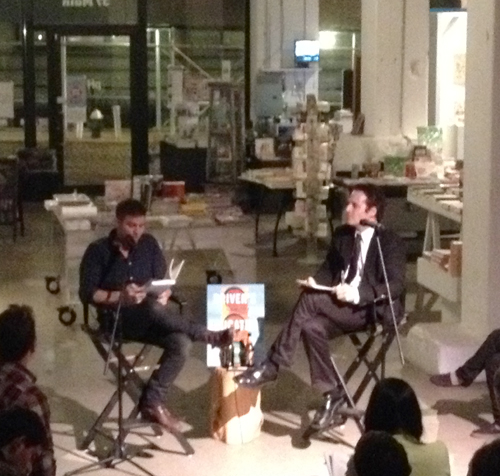
Driver’s Education, the second novel by Grant Ginder, was released this week. He was joined at Powerhouse Books by David Lipsky for a launch party, reading, and conversation.
Wildly entertaining and enthusiastic to have an audience, Ginder read a brief selection from his novel. Many of those present were his current or former students — he teaches expository writing in his spare time at NYU as well as holding an MFA in creative writing from the school.
Before starting off, he tells a few jokes at his own expense, and the audience laughs. He reads with a refined energy, precise and exacting. He spent several years as a speechwriter and its hard to imagine that experience hasn’t impacted his speaking standards as he plows through his prose with a steady, practiced voice. He projects. His elocution is steady. The microphone seems unnecessary.
The reading is short, but that only means launching into conversation with David Lipsky. Lipsky is aggressive with his questions and the conversation seems like the kind of rapid fire discourse on a cable news, only about books and literature.
Driver’s Education, is set in motion when his protagonist leaves a job as a reality television show editor. Ginder explains that he is a connoisseur of reality television, even if it is a “grotesque sick artform.” He did research too, though the impression is this was just an excuse to watch and rewatch his favorite shows. Still, he can pick apart the specific techniques used in reality programming to craft a story.
Ginder is obsessive about watching the shows, particularly the Real Housewives. As he points out however, in many ways reality television is merely a novel form of narrative at the forefront of storytelling. Though he never says it, it seems the argument he is making is much like the rebuttals to early criticism of the novel as a form, we should embrace reality television for what it is, just a new way of creating a fiction and not a portent to the end times.
A few years back, as he finished off college, fearing unemployment, Ginder began working as a speechwriter in Washington D.C., but he didn’t follow politics. Instead he was furtively writing his first novel This Is How It Starts. Speechwriting was a useful exercise to him: “every really great speech is driven by a narrative,” he explains. At the time he read a lot of the usual suspects: Dave Eggers, Zadie Smith, and David Foster Wallace. Despite all this, he projects an image of accidental author saying that he quickly wrote the first novel, that he Googled how many words a novel should be, and when he reached 80,000 words, ended the book.
Eventually he decided to enter the creative writing MFA program at NYU, where some of Driver’s Education began gestating. There, Junot Diaz once said of his sex scenes that “deflated Ziploc bags had more sexual energy.” Ginder has since been compared favorably to Daiz in reviews.
He mentions Twitter as an important medium for the sales side of book publishing. He started his own at the request of his agent, but now he loves tweeting. He tumbles too, and has been telling the story of Mrs. Dalloway through cat pictures in a brilliant Tumblr, Dalloway Cat. He promises a version of the Great Gatsby is on the horizon.
Ginder often ends up writing in Starbucks — he likes escaping from his house — and that makes him a bit of an expert on the city’s coffee shops.
***
Since this reading, Grant Ginder has gone on to publish several more novels. The People We Hate at the Wedding is currently under production with Allison Janey. Support English Kills Review by purchasing books through our Bookshop.org affiliate links.
Drivers Education
Honestly We Meant Well
The People We Hate At the Wedding
Let’s Not Do That Again